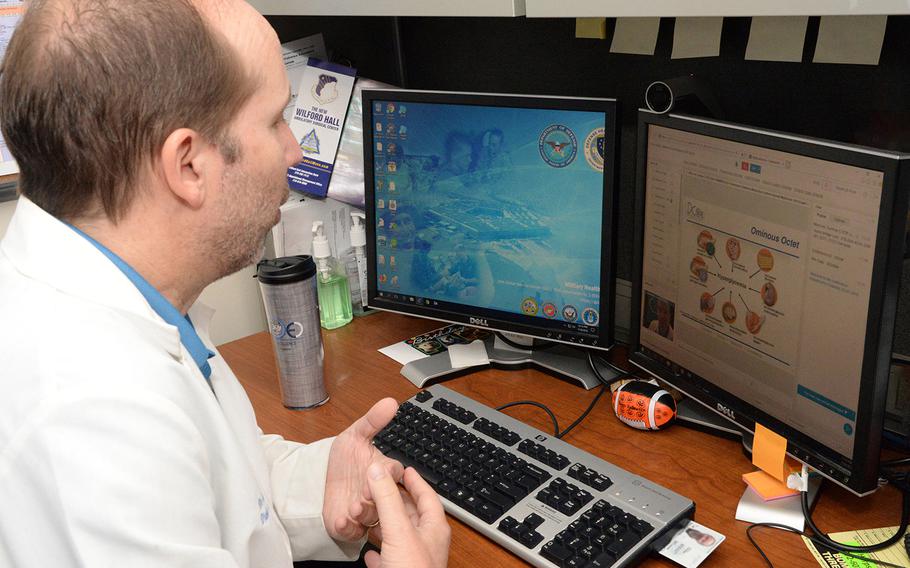
A diabetes specialist with the Diabetes Center of Excellence at Wilford Hall Medical Center, Joint Base San Antonio-Lackland, Texas, conducts a diabetes and prevention ECHO session using telehealth to provide virtual consultation and mentorship for Air Force primary care providers at different military treatment facilities on Nov. 19, 2018. (Josh Mahler/U.S. Air Force)
Stars and Stripes is making stories on the coronavirus pandemic available free of charge. See other free reports here. Sign up for our daily coronavirus newsletter here. Please support our journalism with a subscription.
WASHINGTON — Post-9/11 service members, veterans and their families sought mental health care in greater numbers than other Americans did as the coronavirus pandemic took hold, according to a new survey.
Cohen Veterans Network, which operates mental health clinics nationwide, surveyed 2,026 Americans between March 30 and April 1. The results provide a snapshot of Americans’ mental health amid the pandemic, as most of the country is under some form of stay-at-home orders.
Of people surveyed, 209 were post-9/11 veterans or servicemembers and 221 were military family members. About half of that group reported that they or a family member sought mental health care during the first weeks of the coronavirus pandemic, compared with 14% of nonmilitary respondents.
Anthony Hassan, president of Cohen Veterans Network and an Iraq War veteran, views the statistic as a positive for the military community.
“While some may say, ‘Oh, my gosh, there’s a problem there,’ I was thrilled to see it, honestly,” Hassan said. “I worked my whole career trying to get people to engage in care early — to get help when they need it. They asked for help. That’s remarkable.”
The pandemic has caused health care systems to make a major push toward virtual medical care. The survey found that the post-9/11 military community was more aware of telehealth resources and was five times more likely than the rest of the population to have used them.
Hassan attributes that to military families’ reliance on technology during deployments.
“They’re not afraid of using telehealth,” Hassan said. “They know how to use these online platforms.”
Cohen Veterans Network, which treats post-9/11 service members, veterans and their families, saw a 562% increase in telehealth sessions during the past four weeks.
The Department of Veterans Affairs also reported a significant increase in virtual mental health appointments during the pandemic. VA mental health providers held 34,000 video appointments with veterans in March, up 70% from February. About 154,000 appointments were held over the phone in March, up 280% from February. VA Secretary Robert Wilkie said in a statement that the numbers indicate veterans were accessing virtual mental health care successfully and were embracing it.
Regarding telehealth, the pandemic has “changed the culture of mental health care overnight,” Hassan said. He hopes the moment leads to more widespread adoption of telehealth as an everyday resource for American seeking mental health care. However, he also acknowledged its shortcomings.
Family and couples counseling is difficult over telehealth, and privacy is sometimes an issue, he said. Minors have been worried about whether their parents were listening to their sessions. In one recent case, a client went into her closet for an appointment because of the lack of privacy in her home, Hassan said.
“It can’t be for everyone,” he said. “But the opportunity that came out of this COVID-19 crisis is the emergence and adoption of telehealth.”
Telehealth might continue to be important even after states ease their social-distancing guidelines to meet the higher demand for mental-health care, Hassan said. Because of the isolation and the economic strain many Americans are facing, he’s expecting a surge in Americans seeking care.
In the survey, seven out of every 10 post-9/11 veterans said they were concerned about their mental health because of the social-distancing guidelines. They were significantly more likely than other Americans to report feeling lonely, isolated or to have trouble sleeping.
Mental health issues could also be exacerbated by financial issues, Hassan said. More than 70% of all Americans surveyed said they were worried about their basic necessities, such as keeping their jobs and homes. Six out of ten veterans said they were worried about their employment.
“If you look at any challenges in America — 9/11, the 2008 recession, hurricanes — people tend not to come right out to get care, but soon thereafter the system is flooded,” Hassan said. “We anticipate seeing a lot of this.”
Hassan suggested people try to eat well, to sleep and to exercise, but acknowledged that could be difficult while families are all at home together. He encouraged people to take “time-outs” at home by finding time alone and listening to music, taking a walk around the block or calling someone who’s a good listener. Using telehealth or calling the Veterans Crisis Line also are options, he said.
Soon after social-distancing guidelines went into effect, the VA reported an increase in call volume to the crisis line. The department, as well as lawmakers, are monitoring the number of calls and crisis line staffing levels.
Mental health providers and veterans organizations have come up with methods to try to get veterans to connect with each other. Cohen Veterans Network is offering virtual webinars for clients to socialize. AMVETS, the American Legion and the Veterans of Foreign Wars have encouraged its members check in with friends, and Wounded Warrior Project has created a gaming group.
“So many people are left alone and isolated right now, and just to reach out and talk to someone would be a real good thing,” Hassan said. “The more we can engage, the more likely we are to save lives, families and futures.”
wentling.nikki@stripes.com Twitter: @nikkiwentling